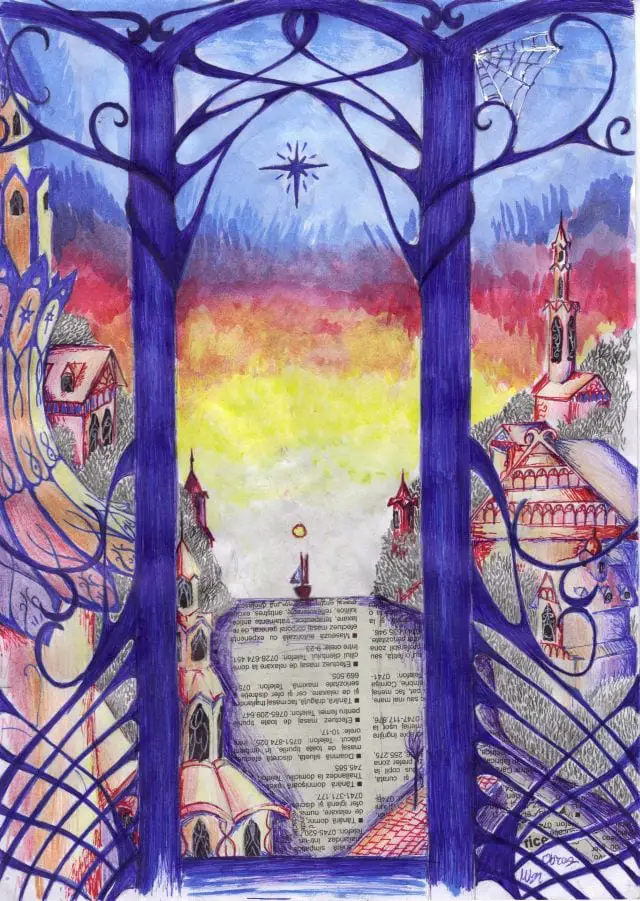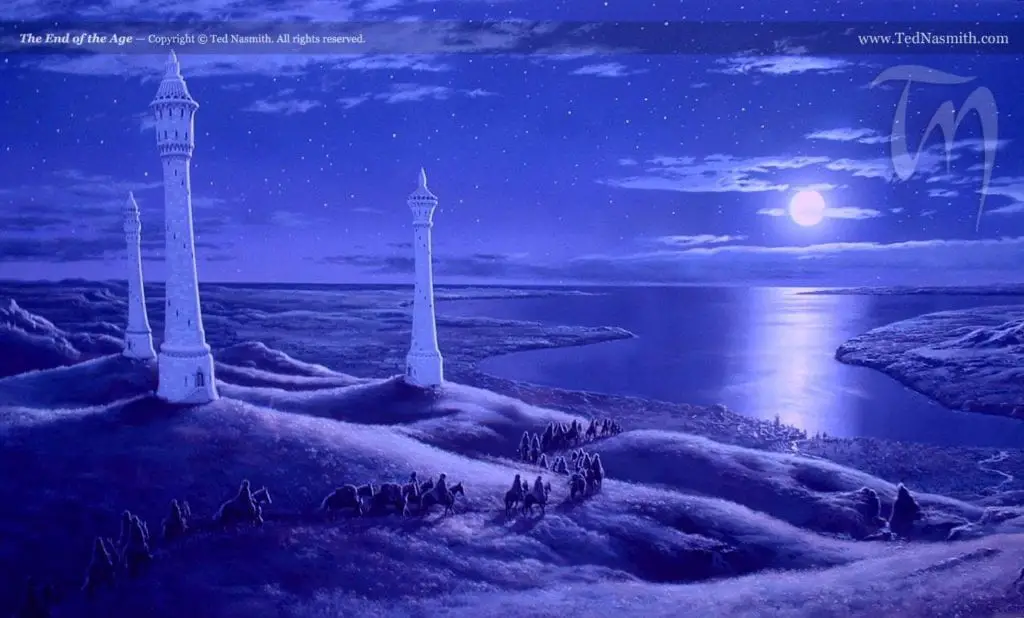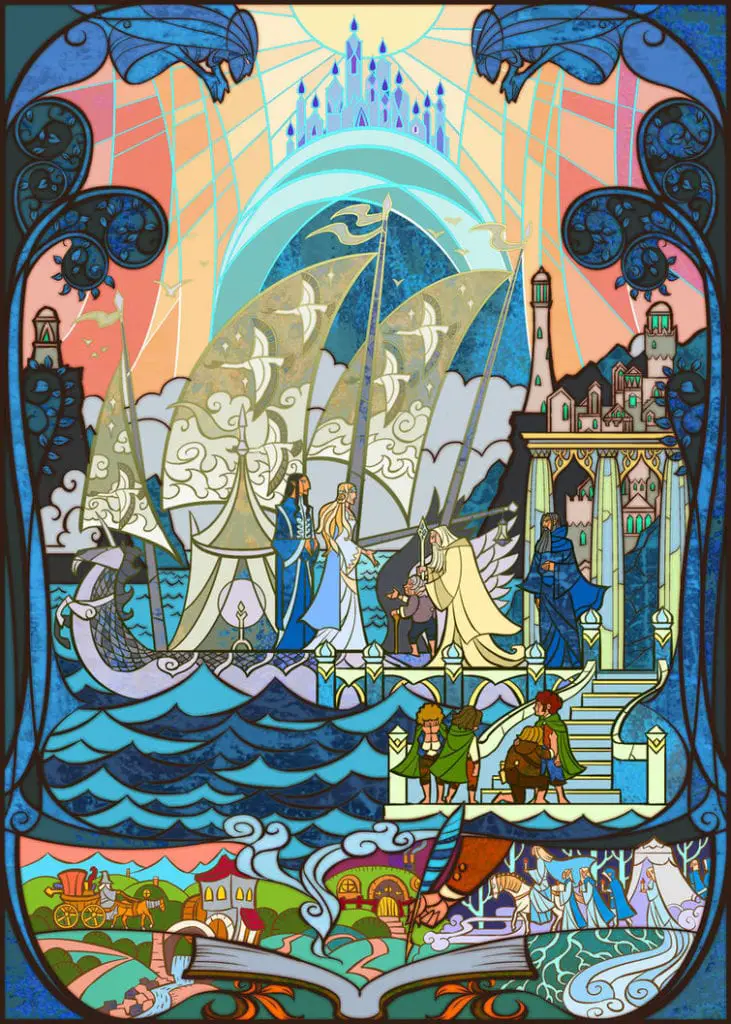I was a bit nervous to re-read “The Grey Havens.” The first time that I made my way through it was one of my most defining reading experiences: I was an…emotional child, and one who was not always the best at picking up on subtle foreshadowing. I was expecting a nice, clear-cut happy ending. I don’t think that it even occurred to me that I wouldn’t get one. And it hit me hard! It was so much sadder than I had thought it would be, and it dug so much deeper.
“The Grey Havens” is an elegant ending to The Lord of the Rings. I hesitate to call it perfect. But, also, if someone criticized it I would be down to fight them? So take that as you will. It starts as a relatively standard happy ending. Everyone is freed, the Shire is rebuilt better than before. Sam gets married, everyone becomes roommates, Merry and Pippin deck themselves out in mail shirts and throw extravagant parties. It’s a pretty nice life, a Fourth Age where everyone hangs out and falls in love surrounded by strawberries and cream.
But this is Frodo’s chapter, and even more so it’s Sam’s. Their story is Middle-earth’s in microcosm, of losing something and building something new. But it’s also just their own. Frodo has been stricken too deeply, has lost too much of himself, to be able to enjoy or even continue within a new world. Sam has to lose something he loves very much, and must build something different and new. That this is simply accepted—not railed against, not ignored, not solved—can make this chapter feel devastating. But I think it also makes it kind of beautiful.
The only mallorn west of the mountains
People who like The Lord of the Rings very much often talk about how its beauty is a sort of achy one. C.S. Lewis jumped on that bandwagon early: his take that Tolkien’s work is filled with “beauties that pierce like swords” plasters itself across book jackets everywhere. I’m not sure I really know what causes that, or where that sense stems from, except perhaps that Tolkien’s beauty is often the sort to arrive as a kind of lifeline, a burst of beauty in the aftermath of loss. It pops up often in his story, but I think “The Grey Havens” is the only chapter that it so thoroughly permeates. There is a lot in this chapter about love and absence, about unimaginable effort being insufficient, but never worthless. It happens in very small moments.
Because of this, “The Grey Havens” feels like a chapter about recovering from grief. It requires work, and courage, and does not come with assurances—though, at first, it seems like it might. Sam, working to restore the Shire, remembers Galadriel’s gift: a small box filled with grey soil and a silver seed. When he’s unsure of how best to use it, Frodo offers advice: “Use all the wits and knowledge you have of your own, Sam,” said Frodo, “and then use the gift to help your work and better it.” He does, filling the Shire with a vibrancy that bursts forth with “a gleam of a beauty beyond that of mortal summers that flicker and pass upon this Middle-earth.” The pinnacle of this, of course, is the mallorn tree, the only one “west of the Mountains and east of the Sea, and one of the finest in the world.”
All of this is very Tolkien-y: more memorialization of the past concurrent with the embrace of something new. The mallorn hearkens back to Lórien, it does not attempt to recreate it. It’s the counterweight to the cold, stark halls of Denethor’s Minas Tirith: a choice to celebrate the past but never to be ossified by it. But it has a more personal connotation too. There is a glimmer, as the Shire comes back to life, that suggest that perhaps one’s own past travails can be of use, that what we’ve learned and lived and suffered can somehow prepare us for the present and allow us to make a more beautiful world. It’s a hope at the core of “The Scouring of the Shire,” and much of “The Grey Havens.”

It will never really heal
For Tolkien this hope is real, and beautiful. But it’s not always fulfilled.
What I like about the close of Frodo’s story at the is that he doesn’t spend the last few chapters of the book under an angsty cloud of Literary Despair. He’s often quite happy. He stays close to his friends. He helps end the difficulties in the Shire and helps restore it in the aftermath. But there’s something wrong. It feels as if he cannot quite fit into place. He’s quieter than he was at the story’s start, and Sam notes that he’s more withdrawn than the other “Travelers.”
Sam was pained to notice how little honor [Frodo] had in his own country. Few people knew or wanted to know about his deeds and adventures; their admiration and respect were given mostly to Mr. Meriadoc and Mr. Peregrin and (if Sam had known it) to himself.
Frodo seems at a remove from everyone else. Tolkien underlines this in his reference to dreams, a prominent point of reference since the hobbits approached The Shire at the end of “Homeward Bound.” Merry noted that their whole adventure had seemed like a dream to him, but Frodo quickly disagreed: to him returning to the Shire felt like “falling asleep again.” In “The Grey Havens,” Sam also compares their first sight of a Black Rider to a distant sort of dream. For most of the hobbits, as they settle into a new life—however much informed by their adventures—the past seems to slip further and further away. For Frodo, we see the inverse. The past isn’t dream, but reality: one that will persistently trump his dreamy present in The Shire.
On the thirteenth of that month Farmer Cotton found Frodo lying on his bed; he was clutching a white gem that hung on a chain about his neck and he seemed half in a dream.
“It is gone forever,” he said, “and now all is dark and empty.”
Later, on the anniversary of the night it was “dark in the dell under Weathertop,” Sam asks his master what’s wrong. “I am wounded,” Frodo answers, “wounded; it will never really heal.” Frodo does not have a new life, a new reality he can step into, at least not one he can rely upon to stay steady and stable and safe. He gives off a sense throughout “The Grey Havens” of someone who simply cannot keep moving forward—much as he would like to, both for himself and for others. And so he goes to the Havens.
An end was come of the story and song
When Frodo makes the decision to go to the Havens, his world seems to shimmer.
It was evening and the stars were glimmering in the eastern sky as they passed the ruined oak and turned and went on down the hill between the hazel-thickets… Frodo was singing softly to himself, singing the old walking-song, but the words were not quite the same.
Still round the corner there may wait
A new road or a secret gate;
And though I oft have passed them by
A day will come at last when I
Shall take the hidden paths that run
West of the Moon and East of the Sun.
And as if in answer, from down below, coming up the road out of the valley, voices sang:
A! Elbereth Gilthoniel!
silivren penna míriel
o menel aglar elenath,
Gilthoniel, A! Elbereth.
We still remember, we who dwell
In this far land beneath the trees
The starlight on the Western Seas.
This is bittersweet and melancholy to the point that it makes my chest hurt (and it’s beyond me at this point to differentiate what of that comes from nostalgia, association, or the story itself). Frodo’s passage into the West isn’t an inherently painful thing: it’s portrayed as beautiful, as a chance for new paths and possibilities for Frodo, as an opportunity for peace. The Third Age was over, and the Days of the Ring were passed, and an end was come of the story and song of those times. But there will be new ones. The same seems promised as Frodo sets sail:
And the sails were drawn up, and the wind blew, and slowly the ship slipped away down the long grey firth; and the light of the glass of Galadriel that Frodo bore glimmered and was lost. And the ship went out into the High Sea and passed on into the West, until at least on a night of rain Frodo smelled a sweet fragrance on the air and heard the sound of singing that came over the water. And then it seemed to him that as in his dream in the house of Bombadil, the grey rain-curtain turned all to silver glass and was rolled back, and he beheld white shores and beyond them a far green country under a swift sunrise.
It’s really lovely! There’s a real sense of solace in these passages, of wounds being (slowly) healed. Frodo deserves that. But this is only Frodo’s chapter in part. After the ship sails away we come back to Sam, and “as he looked at the grey sea he saw only a shadow on the waters that was soon lost.” If this is Frodo’s solace, it’s a sudden tear in Sam’s world.

Well, I’m Back
“The Grey Havens” has to end with Sam. He is the only one who is really poised between these worlds, the character who has the more traditional hero’s journey while serving the character who inverts it. It comes up twice in the last few pages: he feels torn in two.
On one hand Sam is the most intensely involved in the rebuilding of The Shire—he brings it back to life, helps rebuild, and eventually becomes perma-mayor. He is (by-all-appearances-very-happily) married and Frodo foresees him having a boatload of kids. Sam is anchored into this new age in a way that none of the other hobbits are. On the other hand, he’s directly tied to Frodo’s plight (and the passing of the Third Age) both by his own mini-stint as Ringbearer and his love for Frodo. No wonder Sam feels torn.
And it’s not a problem that, directly, gets solved. Frodo promises him that it will be, one day, but never that it will be simple or sudden.
Do no be too sad, Sam. You cannot always be torn in two. You will have to be one, and whole, for many years. You have so much to enjoy, and to be, and to do.”
“But,” said Sam, as tears started in his eyes. “I thought you were going to enjoy the Shire too, for years and years, after all you have done.”
“So I thought too, once. But I have been too deeply hurt, Sam. I tried to save the Shire, and it has been saved, but not for me. It must often be so, Sam, when things are in danger: someone has to give them up, lose them, so that others may keep them. But you are my heir: all that I have and might have had I leave to you. And also you have Rose, and Elanor, and Frodo-lad will come, and Rosie-lass, and Merry, and Goldilocks, and Pippin; and perhaps more that I cannot see. Your hands and wits will be needed everywhere. You will be Mayor of course, for as long as you want to be, and the most famous gardener in history; and you will read things out of the Red Book, and keep alive the memory of the age that is gone, so that people will remember the Great Danger and so love their beloved land all the more. And that will keep you as busy and as happy as anyone can be, as long as your part of the Story goes on.”
Frodo and Sam get such divergent yet complementary endings. Frodo is too hurt to hold onto the Shire: he loses it and is sailed away to a place where his hurts can be healed. Sam holds onto the Shire: but he has to work so, so hard, through so much sadness and uncertainty and change. Frodo has a very metaphysical ending; Sam has a very human one. It’s a part of the reason that I find the last few lines of this book to be so powerful.
And he went on, and there was yellow light, and fire within; and the evening meal was ready, and he was expected. And Rose drew him in, and set him in his chair, and put little Elanor upon his lap.
He drew in a deep breath. “Well, I’m back,” he said.
I usually see this read as an example of the importance of simple earthy things in the pursuit of happiness (and this is Tolkien, so, yes). But I think it’s more than that too? It’s so hopeful and so sad: Sam has just been devastated. But he takes the steps to face it with a hobbit-y resilience. He will help to rebuild the Shire. He will grow things and tell stories and be needed. That “and he was expected” just kills me: that in the face of so much loss, people are waiting for him and counting on him, to join them in building something new.
I think that’s a part of the key to the success of “The Grey Havens” as an ending. The larger, philosophical issues at play become sharply personal when Frodo departs from Sam. For all the general perceptions of The Lord of the Rings as a tale of restoration and conservatism (of which there are certainly aspects) it’s hard for me to read its last pages as anything besides a story of how to cope with loss and to move forward with change.

Final Comments
- Kate Nepveu has noted that this chapter is so good as an ending to The Lord of the Rings that it’s hard to write about; I think she’s right. I had been looking forward to writing about this one for ages but upon reading I mostly just had a lot of inarticulate feelings? Please note this did not stop me from offering one of my longest essays yet.
- On that note: in a truly sobering turn of events, I totaled up a general word count for all of these re-read essays and discovered I have now written 1 word for every 3.25 of Tolkien’s (yikes yikes yikes).
- I know that the abundance of 1420 takes place in spring, but this whole chapter gives me such strong late-summer-evening vibes. The departure for the Havens on September 21st can count as late summer, I guess?
- I had to read through Frodo’s last speech to Sam a few times for this re-read; I CRIED EVERY TIME.
- Prose Prize: I am tempted to give one of the lovelier landscape passages of Frodo and Sam’s journey to the havens, or even Frodo’s rain curtain rolling back. But I think the last bit is the most moving to me, how bittersweet and heartbreaking and hopeful it is. And he went on, and there was yellow light, and fire within; and the evening meal was ready, and he was expected. And Rose drew him in, and set him in his chair, and put little Elanor upon his lap.
He drew in a deep breath. “Well, I’m back,” he said. - Next Time: oh god we made it we’re done. But we’ll come back one more time to chat about Peter Jackson’s closing effort in the trilogy. Join me in getting really jazzed about how good Théoden’s charge is. Join me as I simmer resentfully about Denethor. Are there too many endings? Nah.
Art Credits: Images, in order of appearance, are courtesy of erzsebet-beast, Miruna-Lavinia, Ted Nasmith, and Jian Guo.

